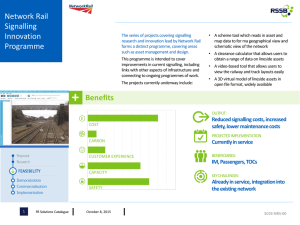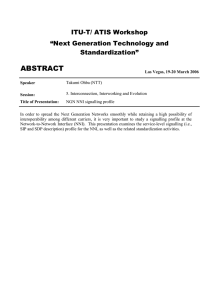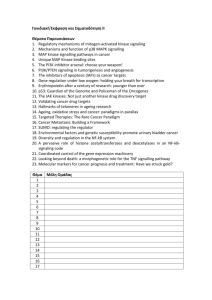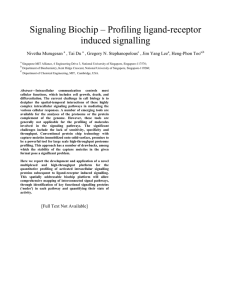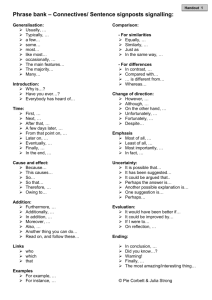ARGUS - SECRET project
advertisement
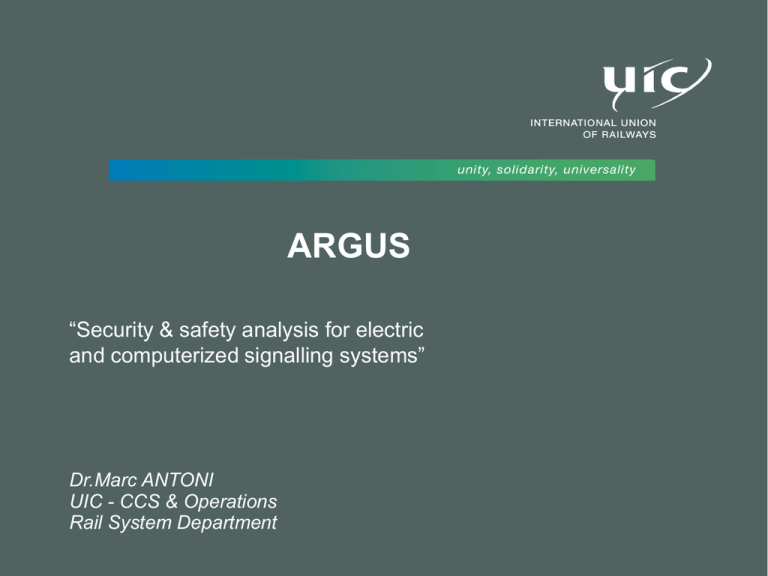
ARGUS “Security & safety analysis for electric and computerized signalling systems” Dr.Marc ANTONI UIC - CCS & Operations Rail System Department Summary 1. New challenge: security for electric signaling system 2. The ARGUS project 3. Security standards 4. A project to clarify the vision of new issues 5. Conclusion 2 New challenge in security of networked critical systems Appearance of new risks related to (malware, attack on control systems and communication interfaces) Which approach of risk analysis for real-time system? How to consider the human factors on the life cycle? Model of the “security levels” function of the strength of attacks? Which safety standards for electric signaling systems for instance? Specification of security requirements for electric signaling systems? 3 The ARGUS Project ARGUS is a hundred-eyed guardian Having “ARGUS EYES” to be lucid and vigilant (miss nothing) The spirit to be shared with the members ARGUS has been defeated by the magic flute of Mercury he fall asleep ARGUS The project aims at designing a security analysis approach, based on risk analysis standard, for railways electric signaling systems, including human factors. 4 Challenge of safety and security of real-time systems The current signaling systems 5 Challenge of safety and security of real-time systems What is the «assumable» risk level regarding the consequences of the threats ? Safety of the railway system presume the postulate of a closed world Using IP Network leads to open system regarding external threats Is « Risk = Frequency x Severity » acceptable ? Haute gravité avec une faible fréquence d’occurrence les conséquences sont elles-ASSUMABLE ? avec quelles seuils d’acceptabilté (une fois peut Acceptable?? suffire à être catastrophique) Severity Risks have to be eradicated Rare events that must be eradicated Acceptable and assumed Risks Faible gravité mais forte occurrence les conséquences sont elles acceptables pour le business Frequency quel seuil ? 6 DKE Meeting - 15 May 2014 Frankfurt 6 Challenge of safety and security of real-time systems Dangerous situation leading from possible attacks Three types of threat can lead to unacceptable situations: 1 - OKWSF (event leading directly to a dangerous wrong side failure) 2 - OKUSF and USFWSF (normal event following a unknown safe failure) 3 - OKDSF and DSFWSF (human error following a detected safe failure) OK USF WS F DSF Occurrence probabilities of threaten attacks: 3 > 2 > 1 DKE Meeting - 15 May 2014 Frankfurt 7 The challenge: security for electric signalling system Dangerous situation leading from possible attacks The railway system has priority for military target ! Many armies have now 4 “army” Air force, Navy, Earth army and Digital army Example 1 : Attack initiated in system components DKE Meeting - 15 May 2014 Frankfurt 8 The challenge: security for electric signalling system Dangerous situation leading from possible attacks The railway system has priority for military target ! Many armies have now 4 “army” Air force, Navy, Earth army and Digital army Example 2 : Activation or virus injection VPN 2 VPN 1 DKE Meeting - 15 May 2014 Frankfurt 9 The challenge: security for electric signalling system Evolution of the situation Which strategy in order to: • • save costs (renewal & maintenance) control the life span of the real time critical signalling systems, their availability (common mode especially), security and safety? Today Signalling functions are independent of the telecom link SIL4 SIL0 Signalling System Closed Telecoms Links Tomorrow SIL4 functions independent of the Network type Signalling System ? SIL4 Signalling System SIL4 10 SIL0 Closed Network SIL4 SIL4 Signalling System Signalling System Open Network with security function SIL4 functions dependent of the (e.g. VLAN) Network type SIL4 Signalling System Security Platform Steering Committee - 10 June 2013 Paris Security barrier Security barrier? 10 Component design issue Architecture choice for a critical networked system Classical architecture • Without independence between System and Functional SW Proposed architecture • With distinction between HW&System SW and the functional SW Formal Proof / signalling time HW&SW / industrial time Know-what Input (TOR or communications in the railway context) Functionalities (interpretable and deterministic model as Petri nets with fixed writing and interpretation rules) Know-how Software supporting the execution of the functionalities Hardware Output (TOR or communications in the railway context) I1 Interface Knowwhy I2 Interface with interpretation rules… N of P architecture(s) of the real time computerised system – SIL4 development Application of formal validation methods 11 System design issues Formal methods for safety and security is a key for a high speed railway critical networked systems, and can help to improve the system durability and to reduce the maintenance Costs. Safety Asset management 12 Security The battle of safety and costs is won or lost at the first stage of the system design !! Performance 12 Security standards EN 50159, VDE V 0831-102, VDE V 0831-104, IEC 27000…: • Safety-relevant threats only • No internal attacker • No consideration of real-time systems • EN 50159, VDE V 0831-102 : protection of communication • VDE V 0831-104 : description of an approach for security analysis, guide line • IEC 27000… No consideration of the peculiarities of critical signalling systems! 13 Security standards IEC 62443 series… Risk model: Risk = damage * probability (Unit: € / year) What about « non assumable » damage? 14 Security standards IEC 62443 series… Classical risk analysis approach Alternative Approach 1? Structure analysis of the target system Identification of the relevant threats Estimation of damage and probability Derivation of security measures to reduce unacceptable risks Prerequisites: Defined methodology for risk analysis Defined classes of damage and probabilities Defined threat catalogue 15 Security standards IEC 62443 series… Classical risk analysis approach Alternative modified risk model 1?: Acceptable?? 16 Security standards IEC 62443 series… Model for strength of attacker Alternative 2: Strength of attacker defined through some parameters Security level “measure of confidence that the system is free from vulnerabilities and function in the intended manner” Definition of risk-based security levels (SL) - SL0: no protection requirements - SL1: protection against casual or coincidental violation - SL2: protection against intentional violation using simple means with low resources, generic skill and motivation - SL3 protection against intentional violation using sophisticated means with moderate resources, system specific skills and moderate motivation - SL4 protection against intentional violation using sophisticated means with extended resources, system specific skills and high motivation SIL4 Signaling System 17 Security standards Threats for signalling systems Malicious software, Escalation of access rights… Possible impact on SAFETY!! Unauthorized access to communication (50159) -Wrong Side Failure (WSF) -Unavailability leading to unsafe situation Exploit of vulnerabilities 18 Security standards Steps for security inspection design ? Steps for security inspection or certification ? Are IEC 62443-xxx enougth for signalling systems? Witch coherence with EN50126, 128, 129 standards? How to manage the following issues ? • all life cycle, • the real-time aspects, • the human factor, • the evolution of the technology A long work has to be done to reach a common approach for all UIC infrastructure signalling system 19 Conclusion Strategic aim of ARGUS: How to avoid at “railway level” sad consequences coming from threats (cyber attacks, …) on operational signaling networks? Availability (fall down of the network) Security (intrusion) and Safety (malware) “Security” management during all the life of the network How to provide alternative structures/architecture to operate until the main structures have been “cleaned” To converge as quick as possible, using the existing or in progress works for all domains or kind of systems 20 20 Thank you for your kind attention Project leader in France Dr. Marc Antoni antoni@uic.org +33 6 29 91 77 43 ARGUS 21
